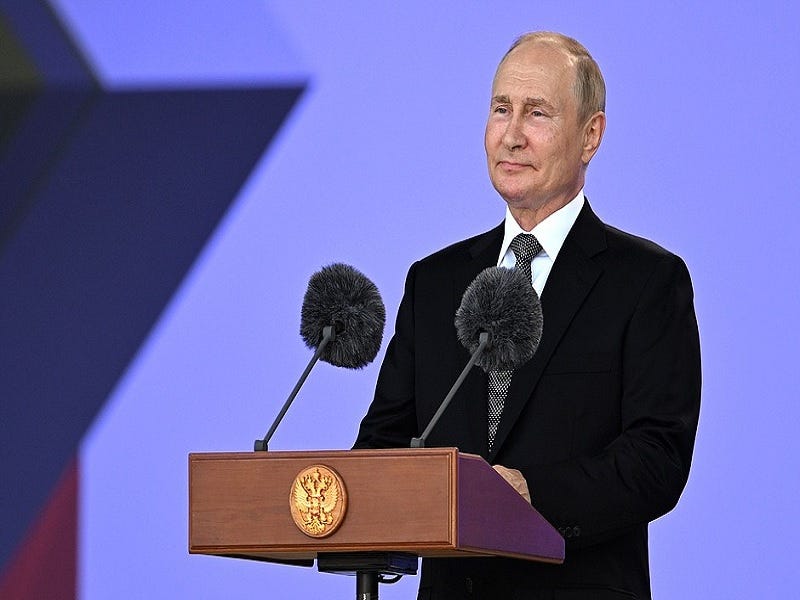Putin Explained The Role Of Russia’s Military Diplomacy In Strengthening Multipolarity
This demonstration of Russian military equipment and President Putin’s invitation for his country’s many Global South partners to scale up their related training with Russia is meant to enhance those states’ “Democratic Security” capabilities and thus help them more play meaningful roles in the global systemic transition to multipolarity upon more confidently defending their sovereignty from Hybrid War schemes.
President Putin’s opening speech at this year’s Army-2022 International Military-Technical Forum and the International Army Games was concise but significant. The Russian leader used this opportunity to inform his country’s distinguished guests about the role of Moscow’s military diplomacy in strengthening multipolarity. This concept refers to the use of military means for achieving political outcomes, which in this case relate to accelerating the global systemic transition to multipolarity and ensuring that it remains on track. What follows is an excerpt of his pertinent comments, followed by a brief analysis thereof in terms of the bigger picture:
“I would like to emphasise that Russia stands for the broadest, comprehensive development of military-technical cooperation. This is particularly important today in the context of the emerging multipolar world.
We highly value the existence of many allies, partners and likeminded people on different continents. These are states that do not bow to the so-called hegemon. Their leaders are displaying a genuine masculine character and do not bow. They are choosing a sovereign, independent road of development. They want to resolve all global and regional security issues collectively on the basis of international law, mutual responsibility and consideration of each other’s interests, thereby contributing to the defence of the multipolar world.
Russia sincerely appreciates historically firm, friendly and truly trustworthy relations with Latin American, Asian and African states. We are ready to offer our allies and partners cutting-edge weapons – from small arms to armoured vehicles and artillery, combat aviation and drones.”
The first part that attracts attention is the Russian leader’s explicit reference to the emerging multipolar world, which aligns with the global revolutionary manifesto that he unveiled late last month for inspiring the BRICS-led Global South to rise up against the neo-colonial yoke of the US-led West’s Golden Billion. The second aspect worthy of note is the acknowledgement that many countries on different continents share the spirit of his worldview, to which end their leaders are embracing the trend that President Putin spoke about earlier this summer connected to the rise of truly sovereign states, which constitutes the third point.
Moving on towards the fourth one, the Russian leader reaffirmed the basis of international law and other universally agreed-upon principles for settling international disputes, which is where the relevance of military-technical cooperation with his country comes in. This leads to the final point about Moscow’s eagerness to engage in military diplomacy with its slew of likeminded and truly sovereign international partners across the Global South for the purpose of bolstering their security and thus enabling them to deter unprovoked threats, which in turn contributes to the defense of the multipolar world exactly as he just mentioned.
The difference between Russia’s practice of military diplomacy and the US’ is that the first-mentioned aims to maintain the balance of power between rival states in order to deter conflict and thus encourage political solutions to their disputes, while the second aspires to disrupt that said balance in support of its preferred partner so as to give them an edge in saber-rattling and possibly even launching a first strike. Quite clearly, Moscow’s model retains international stability and is in full alignment with international law while Washington’s destabilizes the aforementioned and thus blatantly violates international norms.
The increasingly chaotic transition from unipolarity to multipolarity has seen America irresponsibly sow the seeds of conflict across the world in a desperate last-ditch attempt to manipulate the unpredictable processes that it’s seeking to provoke in order to cling to its fading hegemony. This grand strategic trend makes targeted Global South countries’ military diplomacy with Russia more important than ever before, especially considering the Kremlin’s expertise in bespoke “Democratic Security” strategies. That concept refers to the creative array of counter-Hybrid War tactics and strategies for responding to foreign-backed threats such as those that Mali is presently facing from France, for instance.
With this observation in mind, it can be said that Russia’s grand strategic goal (which corresponds with its role in the global systemic transition to multipolarity) is to push back against the above-mentioned American-backed trend so as to preserve peace and stability in International Relations. Unlike Washington with its chaotic Hybrid War rampage across the Global South, Moscow aims to ensure maximum certainty during this very sensitive period in global affairs. The Kremlin is confident that this approach will empower countries to maximally contribute to multipolarity and thus ultimately deal a deathblow to unipolarity so long as they can defend themselves from American destabilization schemes.
The insight shared in this analysis thus enables one to better understand the larger significance of this week’s Army-2022 International Military-Technical Forum and the International Army Games. This demonstration of Russian military equipment and President Putin’s invitation for his country’s many Global South partners to scale up their related training with Russia is meant to enhance those states’ “Democratic Security” capabilities and thus help them more play meaningful roles in the global systemic transition to multipolarity upon more confidently defending their sovereignty from Hybrid War schemes. Through these means, Russia has become a sledgehammer for smashing the US’ unipolar hegemony.




